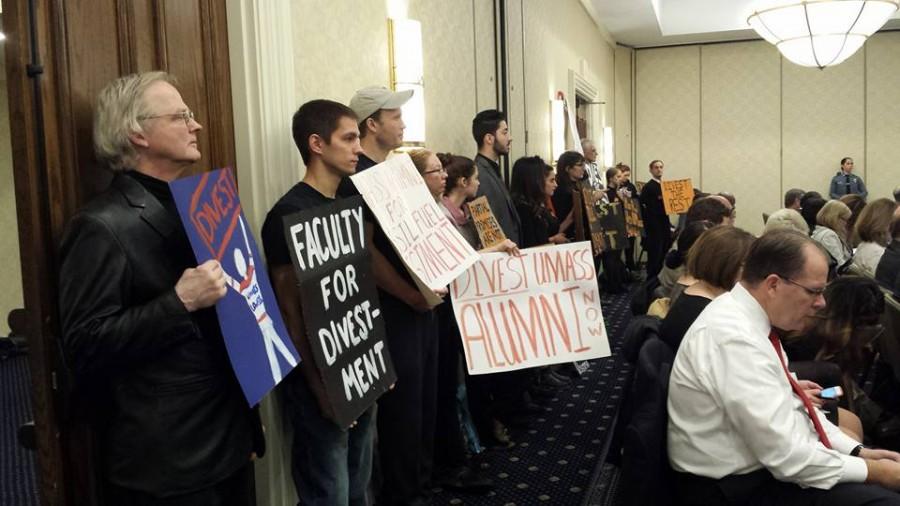UMass Foundation takes first step to divest from fossil fuel industry
Six days before the official vote on fossil fuel divestment, the University of Massachusetts Foundation announced on Dec. 3 that it would stop investing any of its $770 million endowment in the coal industry.
Yesterday, on Dec. 9, the UMass Foundation upheld their decision to divest from coal, but not oil or gas, in an official vote by the Board of Trustees at UMass Lowell. While failing to meet all the demands made by the student-run UMass Fossil Fuel Divestment Campaign (Divest UMass), the decision to divest from coal marks the university’s first shift away from the fossil fuel industry. In doing so, they joined the 498 other institutions around the world that have divested, at least partially, from fossil fuels.
“We are asking that they divest completely from the top 200 publicly traded fossil fuel companies, and not just coal,” said sophomore journalism and anthropology major Mica Reel in an interview with NEPR. “So, while we are really excited that this is a step in the right direction and want to celebrate that, we’re also acknowledging that this is not everything that we were asking for and we’re going to keep pushing for them to finish what we’ve started.”
As of last March, UMass reported it had $3.6 million in direct investments in fossil fuel companies, not quite half the percent of the total endowment. Divest UMass speculates $400,000 of that is invested in coal companies.
The multi-billion dollar coal plant industry in the U.S. has seen a 40 percent decline in the last decade, likely due to the increasing availability of natural gas and emphasis on cleaner wind and solar energy. Knowing this, the UMass Foundation’s decision to divest from coal was more a savvy business strategy than any moral obligation.
Coincidentally, the 21st annual United Nations Conference on Climate Change, or COP21, will conclude this week in Paris. Over 140 heads of state and 30,000 diplomats, scientists, and policy-makers came together in the shell-shocked city, making it one of the largest diplomatic meetings in history.
If all goes well, each country will leave the conference with a plan to cut carbon emissions and search for sustainable energy. For developed nations, this means a dramatic shift away from our oil-centric economies and aggressive investments in sustainable energy. For developing nations, it means preparing for the worst and asking for reparations for the damage already done. The greatest injustice of climate change is that the people hit hardest by droughts, severe weather and sea level rise are not the ones causing it.
The global battle for climate justice started long before the Paris conference. World leaders have been meeting annually for the past two decades trying to come to a consensus on climate change, finding small victories along the way but never a permanent solution. Now, with Republicans in Congress trying to block any taxpayer-financed climate action plan, many people doubt our government will ever be able to agree on a course of action.
The divest movement started in 2011 as a response to government inaction when college students across the country began demanding their institutions to stop investing their endowments in the fossil fuel industry. Unity College was the first academic institution to do this in fall of 2012, and since then, hundreds of universities, businesses, nonprofits and individuals have divested a total of $50 billion from the industry. According to a study by the University of Oxford, the campaign against fossil fuels is the fastest growing divestment movement in history, growing faster than past divestment campaigns surrounding apartheid South Africa and tobacco.
In the shadow of a $4.65 trillion fossil fuel industry, the $400,000 UMass agreed to divest from coal is not very threatening. In fact, UMass has microscopic endowments compared to other private institutions like Harvard with $36 billion in the bank. Our fight to divest won’t hurt the oil industry’s bottom line, but the movement is more an exercise in student power than a narrow-minded assault on the fossil fuel industry.
This is an important distinction to make because student power manifests in many forms. We see it in the growing stigmatization of the fossil fuel industry and the institutions that support it. We see it in every headline praising another school for going fossil free. We see it in every wind turbine, solar panel, bicycle, and every orange felt square safety-pinned to a Jansport backpack. Student power, once it starts, is hard to stop.
In the wake of the attacks on Paris by the Islamic State, the city cancelled the climate march scheduled for the Sunday before COP21 commenced. Demonstrators instead laid out over 10,000 pairs of shoes in the Place de la Republique, the city’s central square, as a symbolic way to take part in the worldwide march. Among the sneakers was a pair of simple black dress shoes sent by Pope Francis.
“I can’t separate the fight with terrorism from the fight against global warming,” said French president Francois Hollande in his opening remarks at COP21, “These are two big global challenges we have to face up to, because we have to leave our children more than a world freed of terror, we also owe them a planet protected from catastrophes.”
If UMass truly wants to play a leading role in addressing these global problems, they will not use this first small step as an excuse for inaction. They need to do more than divest from coal, and they need to do more than divest from fossil fuels. Divest UMass should demand the university divest all our $3.6 million from fossil fuels and invest that money in long-term sustainable energy solutions. Right now, world leaders at COP21 are making plans to promote the research and development of sustainable energy and avoid the irreversible effects of climate change, but we cannot wait for a top-down solution that may never come. We need to use student power to make change.
Email Sarah Robertson at [email protected], or follow her on Twitter @srobertson__.











